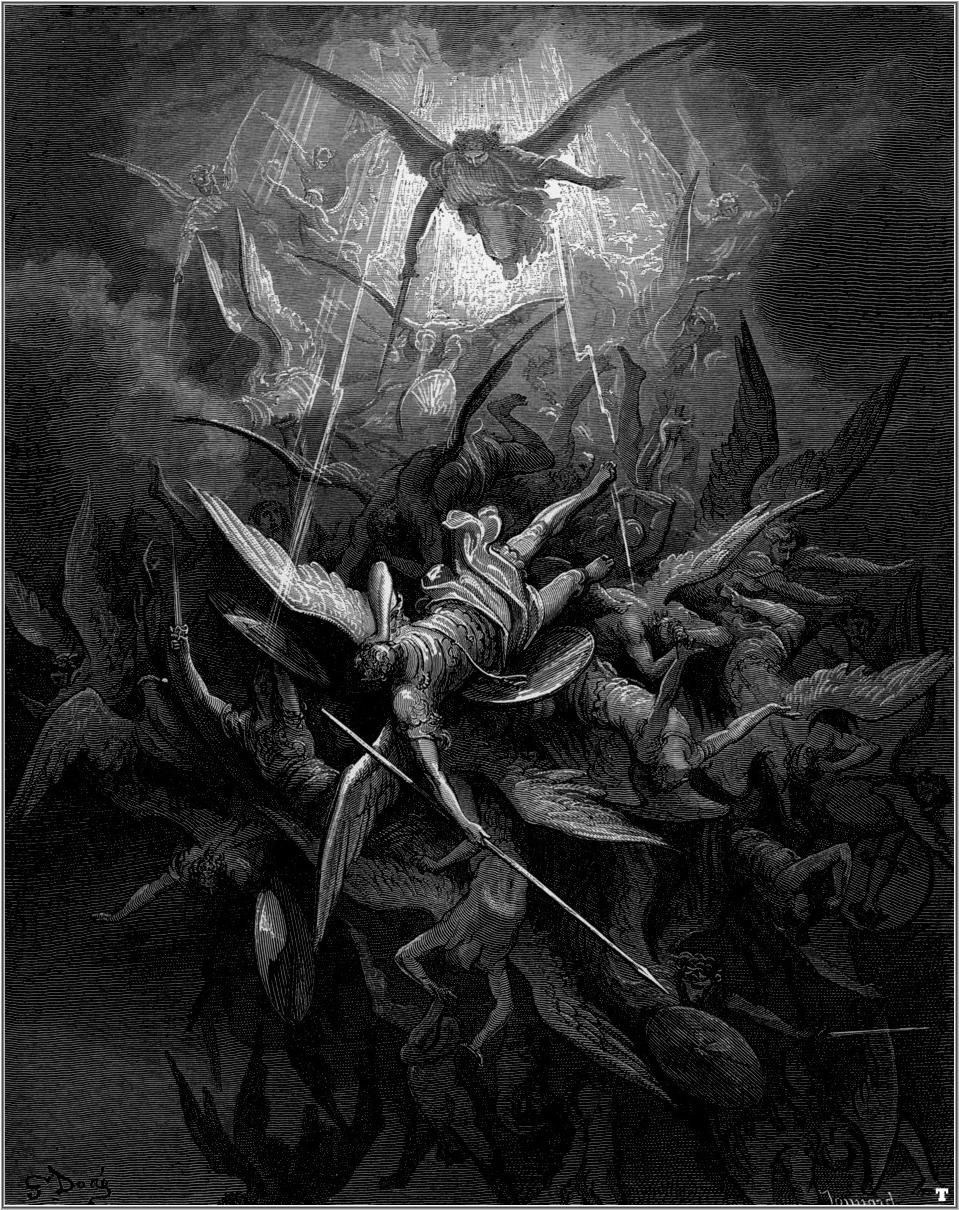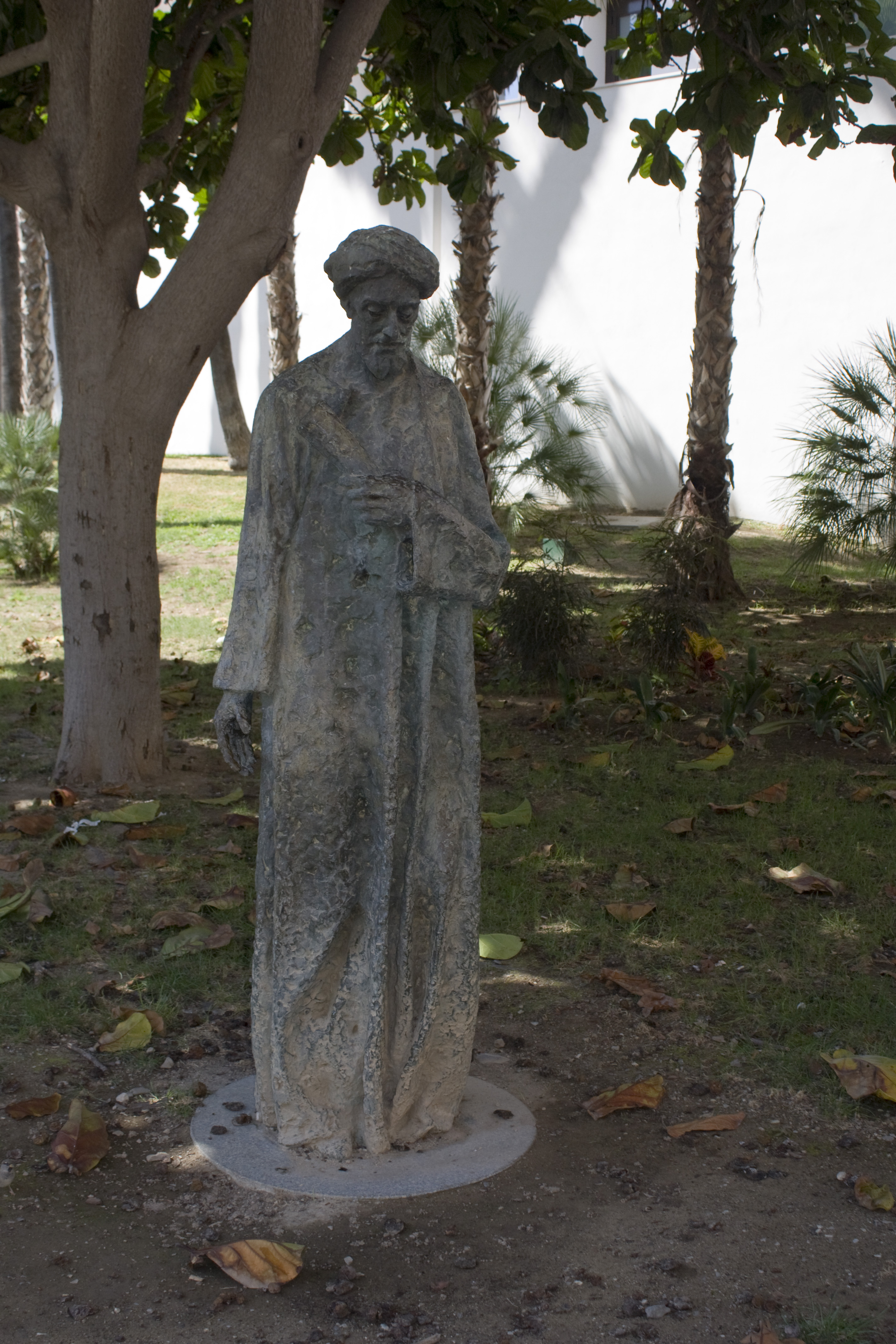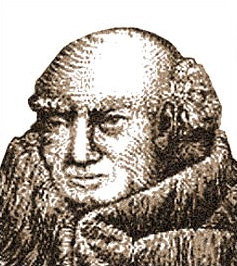|
David De Dinan
David of Dinant ( 1160 – c. 1217) was a pantheistic philosopher. He may have been a member of, or at least been influenced by, a pantheistic sect known as the Amalricians. David was condemned by the Catholic Church in 1210 for his writing of the " Quaternuli" (Little Notebooks), which forced him to flee Paris. When and where he died is unknown; all that can be ascertained is that he died after the year 1215, as he was condemned again in the council of 1215. Since David's works were banned, most of what is known of him is from the writings of his contemporaries and opponents, chiefly Albert the Great and St. Thomas Aquinas. David's philosophy was that everything could be divided among bodies, minds, and eternal substances. The indivisible substrate or constituent of bodies is matter (''hyle''); of minds or souls, intellect (''nous''); and of eternal substances, God (''Deus''). These three, matter, intellect, and God, are actually one and the same. Consequently, all things, mat ... [...More Info...] [...Related Items...] OR: [Wikipedia] [Google] [Baidu] |
Pantheism
Pantheism can refer to a number of philosophical and religious beliefs, such as the belief that the universe is God, or panentheism, the belief in a non-corporeal divine intelligence or God out of which the universe arisesAnn Thomson; Bodies of Thought: Science, Religion, and the Soul in the Early Enlightenment, 2008, page 54. as opposed to the corporeal gods of religion such as Yahweh. The former idea came from Church theologians who, in attacking the latter form of pantheism, described pantheism as the belief that God is the material universe itself.Worman, J. H., "Pantheism", in ''Cyclopædia of Biblical, Theological, and Ecclesiastical Literature, Volume 1'', John McClintock, James Strong (Eds), Harper & Brothers, 1896, pp. 616–624. Under some conceptions of pantheism, the universe is thought to be an immanent deity, still expanding and creating, which has existed since the beginning of time. Pantheism can include the belief that everything constitutes a unity and that t ... [...More Info...] [...Related Items...] OR: [Wikipedia] [Google] [Baidu] |
Peter Of Corbeil
Peter of Corbeil (died 3 June 1222), born at Corbeil, was a preacher and canon of Notre Dame de Paris, a scholastic philosopher and master of theology at the University of Paris, ca 1189. He is remembered largely because his aristocratic student Lotario de' Conti became pope as Innocent III. In 1198 Innocent appointed him to the sinecures of prebendary and archdeacon of York. The following year Innocent raised his former master to the see of Cambrai, an immensely important diocese with a jurisdiction that covered Flanders. Peter became Archbishop of Sens in 1200. His interest in the intellectual life of Paris was undiminished: in 1210 he convoked a council at Paris that forbade the teaching, whether in public or privately, of the recently rediscovered Natural Philosophy (the Physics and very likely the Metaphysics) of Aristotle and the recently translated commentaries on Aristotle of Averroës (''nec libri Aristotelis de naturali philosophia nec commenta legantur Parisius public ... [...More Info...] [...Related Items...] OR: [Wikipedia] [Google] [Baidu] |
Joachim Of Floris
Joachim of Fiore, also known as Joachim of Flora (; ; 1135 – 30 March 1202), was an Italian Christian theologian, Catholic abbot, and the founder of the monastic order of San Giovanni in Fiore. According to theologian Bernard McGinn, "Joachim of Fiore is the most important apocalyptic thinker of the whole medieval period." The ''Divine Comedy'' of Dante Alighieri is one of the most famous works possibly inspired by his ideas. Later followers, inspired by his works in Christian eschatology and historicist theories, are called Joachimites. Biography Born in the small village of Celico near Cosenza, in Calabria (at the time part of the Kingdom of Sicily), Joachim was the son of Mauro de Celico, a well-placed notary, and Gemma, his wife. He was educated at Cosenza, where he became first a clerk in the courts, and then a notary himself. In 1166–1167 he worked for Stephen du Perche, archbishop of Palermo (c. 1167–1168) and counsellor of Margaret of Navarre, regent for the yo ... [...More Info...] [...Related Items...] OR: [Wikipedia] [Google] [Baidu] |
Cathar
Catharism ( ; from the , "the pure ones") was a Christian quasi- dualist and pseudo-Gnostic movement which thrived in Southern Europe, particularly in northern Italy and southern France, between the 12th and 14th centuries. Denounced as a heretical sect by the Catholic Church, its followers were attacked first by the Albigensian Crusade and later by the Medieval Inquisition, which eradicated the sect by 1350. Around 1 million were slaughtered, hanged, or burnt at the stake. Followers were known as Cathars or Albigensians, after the French city Albi where the movement first took hold, but referred to themselves as Good Christians. They famously believed that there were not one, but two Godsthe good God of Heaven and the evil god of this age (). According to tradition, Cathars believed that the good God was the God of the New Testament faith and creator of the spiritual realm. Many Cathars identified the evil god as Satan, the master of the physical world. The Cathars believe ... [...More Info...] [...Related Items...] OR: [Wikipedia] [Google] [Baidu] |
1913 Catholic Encyclopedia
''The'' ''Catholic Encyclopedia: An International Work of Reference on the Constitution, Doctrine, Discipline, and History of the Catholic Church'', also referred to as the ''Old Catholic Encyclopedia'' and the ''Original Catholic Encyclopedia'', is an English-language encyclopedia about Catholicism published in the United States. It was designed "to give its readers full and authoritative information on the entire cycle of Catholic interests, action and doctrine". The first volume of the ''Catholic Encyclopedia'' appeared in March 1907 and the last three volumes appeared in 1912, followed by a master index volume in 1914 and later supplementary volumes. Its successor, the ''New Catholic Encyclopedia'', was first published by the Catholic University of America in 1967. ''The'' ''Catholic Encyclopedia'' was published by the Robert Appleton Company (RAC) in New York City. RAC was a publishing company incorporated in February 1905 for the express purpose of publishing the ency ... [...More Info...] [...Related Items...] OR: [Wikipedia] [Google] [Baidu] |
Gundisalvi Of Segovia
Dominicus Gundissalinus, also known as Domingo Gundisalvi or Gundisalvo ( 1115 – after 1190), was a philosopher and translator of Arabic to Medieval Latin active in Toledo, Spain. Among his translations, Gundissalinus worked on Avicenna's ''Liber de philosophia prima'' and ''De anima'', Ibn Gabirol's ''Fons vitae'', and al-Ghazali's ''Summa theoricae philosophiae'', in collaboration with the Jewish philosopher Abraham Ibn Daud and Johannes Hispanus. As a philosopher, Gundissalinus crucially contributed to the Latin assimilation of Arabic philosophy, being the first Latin thinker in receiving and developing doctrines, such as Avicenna's modal ontology or Ibn Gabirol's universal hylomorphism, that would soon be integrated into the thirteenth-century philosophical debate. Life Born in Castile around 1115–1125, Gundissalinus received his education in Chartres, supposedly following the teaching of William of Conches and Thierry of Chartres. Since 1148, Gundissalinus is in Castile ... [...More Info...] [...Related Items...] OR: [Wikipedia] [Google] [Baidu] |
Fons Vitae
Fons may refer to: Places * Fons, Ardèche, France * Fons, Gard, France * Fons, Lot, France Other uses * ''Fons memorabilium universi'', a Renaissance encyclopedia * Fontus, an ancient Roman water deity * Leonard Fons (1903–1956), American politician * Jorge Fons Pérez (1939-2022), Mexican film director * A Dutch masculine given name, see Alphons Alphons (Latinized ''Alphonsus'', ''Adelphonsus'', or ''Adefonsus'') is a male given name recorded from the 8th century ( Alfonso I of Asturias, r. 739–757) in the Christian successor states of the Visigothic Kingdom in the Iberian Peninsula. ... See also * Fon (other) {{disambiguation, geo ... [...More Info...] [...Related Items...] OR: [Wikipedia] [Google] [Baidu] |
Avicebron
Solomon ibn Gabirol or Solomon ben Judah (, ; , ) was an 11th-century Jewish poet and philosopher in the Neo-Platonic tradition in Al-Andalus. He published over a hundred poems, as well as works of biblical exegesis, philosophy, ethics and satire. One source credits ibn Gabirol with creating a golem, possibly female, for household chores. In the 19th century it was discovered that medieval translators had Latinized Gabirol's name to Avicebron or Avencebrol and had translated his work on Jewish Neo-Platonic philosophy into a Latin form that had in the intervening centuries been highly regarded as a work of Islamic or Christian scholarship. As such, ibn Gabirol is well known in the history of philosophy for the doctrine that all things, including soul and intellect, are composed of matter and form ("Universal Hylomorphism"), and for his emphasis on divine will. Biography Little is known of Gabirol's life, and some sources give contradictory information. Sources agree that he was ... [...More Info...] [...Related Items...] OR: [Wikipedia] [Google] [Baidu] |
Johannes Scotus Eriugena
John Scotus Eriugena, also known as Johannes Scotus Erigena, John the Scot or John the Irish-born ( – c. 877), was an Irish Neoplatonist philosopher, theologian and poet of the Early Middle Ages. Bertrand Russell dubbed him "the most astonishing person of the ninth century". Russell, Bertrand. ''The History Of Western Philosophy'' The ''Stanford Encyclopedia of Philosophy'' states that he "is the most significant Irish intellectual of the early monastic period. He is generally recognized to be both the outstanding philosopher (in terms of originality) of the Carolingian era and of the whole period of Latin philosophy stretching from Boethius to Anselm". He wrote a number of works, but is best known today for having written ''De Divisione Naturae'' ("The Division of Nature"), or ''Periphyseon'', which has been called the "final achievement" of ancient philosophy, a work which "synthesizes the philosophical accomplishments of fifteen centuries". The principal concern ... [...More Info...] [...Related Items...] OR: [Wikipedia] [Google] [Baidu] |
Intellect
Intellect is a faculty of the human mind that enables reasoning, abstraction, conceptualization, and judgment. It enables the discernment of truth and falsehood, as well as higher-order thinking beyond immediate perception. Intellect is distinct from ''intelligence'', which refers to the general ability to learn, adapt, and solve problems, whereas ''intellect'' concerns the application of reason to abstract or philosophical thought. In philosophy, intellect () has often been contrasted with , a term referring to the faculty of direct intuitive knowledge. While intellect engages in discursive reasoning, breaking down concepts into logical sequences, ''nous'' is considered a higher cognitive faculty that allows for direct perception of truth, especially in Platonism and Neoplatonism. Aristotle distinguished between the active intellect (), which abstracts universal concepts, and the passive intellect, which receives sensory input. During late antiquity and the Middle Ages, ... [...More Info...] [...Related Items...] OR: [Wikipedia] [Google] [Baidu] |
Matter
In classical physics and general chemistry, matter is any substance that has mass and takes up space by having volume. All everyday objects that can be touched are ultimately composed of atoms, which are made up of interacting subatomic particles. In everyday as well as scientific usage, ''matter'' generally includes atoms and anything made up of them, and any particles (or combination of particles) that act as if they have both rest mass and volume. However it does not include massless particles such as photons, or other energy phenomena or waves such as light or heat. Matter exists in various states (also known as phases). These include classical everyday phases such as solid, liquid, and gas – for example water exists as ice, liquid water, and gaseous steam – but other states are possible, including plasma, Bose–Einstein condensates, fermionic condensates, and quark–gluon plasma. Usually atoms can be imagined as a nucleus of protons and neu ... [...More Info...] [...Related Items...] OR: [Wikipedia] [Google] [Baidu] |
Materia Prima
In alchemy and philosophy, prima materia, materia prima or first matter (for a philosophical exposition refer to: Prime Matter), is the ubiquitous starting material required for the alchemical magnum opus and the creation of the philosopher's stone. It is the primitive formless base of all matter similar to chaos, the quintessence or aether. Esoteric alchemists describe the prima materia using simile, and compare it to concepts like the anima mundi. History The concept of prima materia is sometimes attributed to Aristotle. The earliest roots of the idea can be found in the philosophy of Anaxagoras, who described the nous in relation to chaos. Empedocles' cosmogony is also relevant. When alchemy developed in Greco-Roman Egypt on the foundations of Greek philosophy, it included the concept of prima materia as a central tenet. Mary Anne Atwood uses words attributed to Arnaldus de Villa Nova to describe the role of prima materia in the fundamental theory of alchemy: "That there ... [...More Info...] [...Related Items...] OR: [Wikipedia] [Google] [Baidu] |









